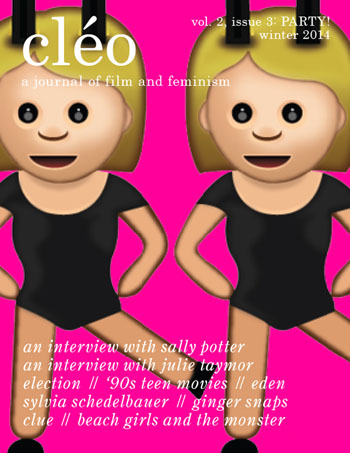“Can feminists party?” asks cléo editor Kiva Reardon, arguing that “it’s a mistake to dismiss parties, and especially the act of partying, as merely frivolous. Reclaiming parties and thinking about them through a feminist lens has the potential to incite radical change by opening dialogues about consent culture, how we conceive of public space, and challenge toxic masculinity.”
This new issue features two interviews—Kiva Reardon‘s with Julie Taymor and Tim Hayes‘s with Sally Potter—a roundtable on teen party movies from the 90s, plus: James Hansen‘s profile of experimental filmmaker Sylvia Schedelbauer, Eleni Deacon on Alexander Payne’s Election (1999) and its “paradox of female leadership,” Kathleen Kampeas-Rittenhouse on Jonathan Lynn’s Clue (1985; “each female guest’s secret identity reveals a struggle to wrest power from a male-dominated society”), Lindsay Jensen on Mia Hansen-Løve’s Eden, Justine Smith on John Fawcett’s Ginger Snaps (2000; “perhaps the only teen horror film to connect the idea of werewolves to the menstrual cycle”) and Manisha Aggarwal-Schifellite: “While other beach party movies have gone on to greater cult fame, [Jon Hall’s] Beach Girls and the Monster’s [1965] combination of carefree partying and untimely death reveal the complexities of the place of teenagers in American culture in the 1960s.”
Catherine Grant‘s been tweeting a storm of great tips lately and one of them leads us to the new war-themed issue NECSUS, the European Journal of Media Studies. Therein:
- The late Harun Farocki on the genesis of Serious Games.
- Francesco Pitassio‘s conversation with Anton Kaes about, among other things, his new book, Shell Shock Cinema: Weimar Culture and the Wounds of War.
- Thomas Pringle on “War and media in light of nuclear events.”
- Masha Shpolberg, “Rethinking the role of sound in World War II newsreels.”
- Pasi Väliaho‘s “Notes on the visual economy of drones.”
- Cristina Álvarez López and Adrian Martin‘s “Introduction to the audiovisual essay: A child of two mothers.”
- Dirk de Bruyn‘s Found Found Found:
- “Smells like Armageddon Day – Dreamlike Settings and Magnified Trash,” an audiovisual essay by Laura Lammer on the world of Gregg Araki’s characters.
- James Harvey-Davitt sees “Rancière’s as a contemporary revision of two major French contributors to writings on Rossellini.”
- Julian Hanich: “Laughter and collective awareness: The cinema auditorium as public space.”
Catherine also introduces us to a new Journal of Music, Sound and Moving Image, Kinetophone. The inaugural issue focuses on “Opera and Cinema.” Rebecca Dowd Geoffroy-Schwinden “explores Dario Argento‘s invocation of classic musical gestures of opera and horror film in his 1987 film Opera,” while João Pedro Cachopo considers “three movies from the early 1980s—Beineix’s Diva (1981), Herzog‘s Fitzcarraldo (1982), and Fellini‘s E la nave va (1983)—in which the technological reproduction of opera is immanent to the films themselves.” For starters.
One more from Catherine. In Critical Theory Online, Izabella Füzi writes about “Sound And Cinema in Balázs’s Film Aesthetics.”
Meantime, for In Media Res, Catherine herself writes about the “unintended consequences” of launching her invaluable resource, Film Studies for Free.
Another new publication, this one via Nicole Brenez: “Residing at a crossroads between film journal and radical newsreel, Now! A Journal of Urgent Praxis will foreground films and writings made in rapid yet eloquent engagement with the here and now of political and cultural life. Now! can respond to crisis. Now! can offer the radical reply.”
“Cineaste has always been well known for its regular coverage of the Hollywood blacklist,” write the editors, introducing the new issue. ” If there’s any reason to be obsessed with the blacklist and its legacy, it stems from the brute fact that civil liberties and artistic expression are always endangered when abstractions like ‘national security’ trump the free exchange of ideas.”
Online from this issue: Previews of Adrian Martin‘s essay on the correspondence between Parker Tyler and Siegfried Kracauer, Michael Bronski‘s on James Franco and Richard Porton’s interview with Ruben Östlund (Force Majeure); Aaron Cutler‘s interview with Nils Malmros; Porton’s reports from Locarno and Toronto; and four DVD/Blu-ray reviews: David Sterritt on Jack Arnold‘s High School Confidential! (1958), Matthew Hays on William Wyler‘s The Children’s Hour (1961), Christopher Sharrett on John Huston‘s The Unforgiven (1960) and Matt Losada on six releases of Spanish avant-garde works.
For SPD, Steven Gregor asks sixteenbynine editor Cal King, “Why start a magazine about television?”
And finally for now, the gorgeous magazine Fireflies is preparing its second issue on Abbas Kiarostami and Béla Tarr and has issued a call for submissions. Deadline: January 4.
For news and tips throughout the day every day, follow @KeyframeDaily. Get Keyframe Daily in your inbox by signing in at fandor.com/daily.




